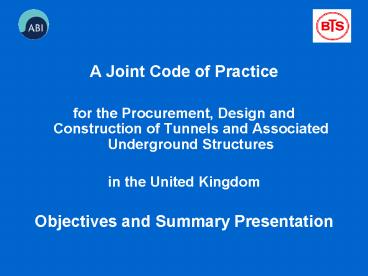A Joint Code of Practice - PowerPoint PPT Presentation
1 / 18
Title:
A Joint Code of Practice
Description:
Contents. 1 Objective of the Code. 2 Compliance with the Code. 3 Introduction ... Code is pre-requisite for obtaining Insurance on all projects where the value of ... – PowerPoint PPT presentation
Number of Views:23
Avg rating:3.0/5.0
Title: A Joint Code of Practice
1
- A Joint Code of Practice
- for the Procurement, Design and Construction of
Tunnels and Associated Underground Structures - in the United Kingdom
- Objectives and Summary Presentation
2
Key Insurer Objectives
- Have in place risk assessment and management
procedures for the tunnelling sector
to - Reduce the probability of a loss happening
- Reduce the size of a claim when it happens
- Provide Insurers with a better framework for
understanding risks during the underwriting
process - Provide increased certainty on financial exposure
3
Key Insurer Objectives
- Create an auditable trail for Insurers to
ensure compliance - Acknowledge that the Joint Code will not prevent
claims happening
4
JCoP for Tunnelling Contents
1 Objective of the Code 2 Compliance with the
Code 3 Introduction 4 Definitions and Terms
used in the Code 5 Risk Assessment and
Management 6 Client Role and Responsibilities
7 Project Development Stage 8 Construction
Contract Procurement Stage 9 Design 10
Construction Stage
5
JCoP for Tunnelling
Section 1 - Objective of the Code
- To promote and secure Best Practice for the
minimisation and management of risks associated
with Tunnel Works - Applies to Project Development, Design,
Construction Contract Procurement and
Construction Stages of a Project - Does not supersede, replace or override existing
Standards, legislation etc.
6
JCoP for Tunnelling
Section 2 Compliance
- Compliance with the Code is pre-requisite for
obtaining Insurance on all projects where the
value of the Tunnel Works is 1m or above
7
JCoP for Tunnelling
Section 3 Introduction
- Requires identification of hazards and the
management of associated risks to ensure their
reduction to a level as low as reasonably
practicable (ALARP) - Responsibility for risk management to be
explicitly allocated to relevant parties and
clearly identified
8
JCoP for Tunnelling
Section 4 Definitions and Terms
9
JCoP for Tunnelling
Section 5 Risk Assessment and Management
- Defines Risk ( consequence of a hazard x
likelihood of occurrence) - Lists hazards (as events which have the
potential to impact on a Tunnel Works project)
and includes - health and safety
- the environment
- the design and the costs and programme for design
- the construction of the project including the
programme and cost for construction - Third Parties and existing facilities
10
JCoP for Tunnelling
Section 5 Risk Assessment and Management
(contd)
- Notes that hazards should be identified on a
project-specific basis - Risks to be identified and quantified through
Risk Assessments for all stages of a project - Highlights the requirement for clarification of
the allocation of risks (ie ownership - risk
owners are those best able to manage the risks)
11
JCoP for Tunnelling
Section 5 Risk Assessment and Management
(contd)
- Requires Risk Registers to identify the hazards,
consequent risks, mitigation/contingency plans,
proposed actions, responsibilities, critical
dates for completion of actions and when actions
have been closed out - Risk Registers are to provide the auditable
trail throughout the life of a project to
demonstrate compliance with the Code.
12
JCoP for Tunnelling
Section 6 Client Role and Responsibilities
- Requires Clients to have demonstrable technical
and contract management competence appropriate to
the type, scope and extent of the project
proposed
13
JCoP for Tunnelling
Section 7 Project Development Stage
- Site and ground investigations to be designed,
planned, procured and supervised by suitably
competent personnel - Site and ground investigations to be executed by
competent organisations
14
JCoP for Tunnelling
Section 8 Construction Contract Procurement
Stage
- Selection of type of contract by the Client
should take due regard of the allocation of risks
to the parties to the Contract and consequently
the liabilities of the parties to the Contract
15
JCoP for Tunnelling
Section 9 Design Stage(s)
- Principle is to achieve a robust design i.e.
where risk of failure or damage is extremely
remote - Includes for preliminary and detailed designs and
temporary works and permanent works designs - Section is not prescriptive in terms of Design
Methods
16
JCoP for Tunnelling
Section 9 Design Stage(s) (contd)
- Design Risk Assessments to consider the impact
on the design and hence its implementation of
design criteria variations, potential failure
mechanisms and intermediate construction stages
17
JCoP for Tunnelling
Section 10 Construction Stage
- Requirement for a Project Risk Management Plan to
identify means and methods of monitoring,
reviewing and updating Construction Stage Project
Risk Register - Construction Stage Project Risk Register to
include all project related risks identified at
the Construction Stage together with
project-related risks brought forward from the
Client's pre-contract Risk Register and which may
include health and safety risks
18
JCoP for Tunnelling
Section 10 Construction Stage (contd)
- Carry out constructability reviews jointly with
the Designer to ensure construction methods are
suitable and appropriate - In the case of self-certification, Contractor to
demonstrate how independent supervision of
construction will be controlled and maintained - Value engineering proposals to include Risk
Assessments

